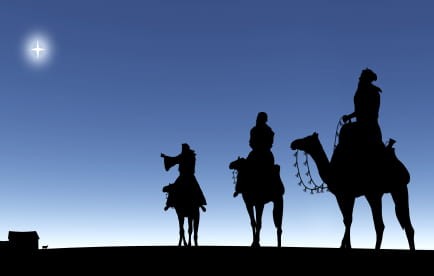We Three Kings
- Published Nov 30, 2015

“After Jesus was born in Bethlehem of Judea in the days of King Herod, wise men from the east arrived unexpectedly in Jerusalem” (Matthew 2:1).
They needed a song for the Christmas program.
That’s why John Henry Hopkins wrote this carol in 1857. He was an author, book illustrator, designer of stained glass, and the musical director for the General Theological Seminary in New York City. Though he wrote other songs for the program, “We Three Kings” is the only one still in general use.
Strictly speaking, this is an Epiphany Carol because it recalls the coming of the Wise Men from the East to offer gifts to the Christ child.
When we read Mathew 2, we discover something interesting. The Wise Men show up in Jerusalem after the birth of Jesus. That runs contrary to the notion the shepherds and the Wise Men arrive in Bethlehem at the same time. Not so. The shepherds were there the night Jesus was born. The Wise Men came later.
But how much later? No one knows for certain. It may have been a few months later. Some think even a year or so later. One hint: It was at least a few days later because when the Wise Men found Jesus, he was with his mother in a house in Bethlehem, not in a manger.
That fits well with the tradition that the Wise Men came 12 days after Christmas--on January 6, usually called Epiphany in the liturgical calendar. Epiphany celebrates the manifestation of Christ to the Gentiles.
The poem John Henry Hopkins wrote is a little gem in that it covers, verse by verse, every part of the story of the coming of the Wise Men in Matthew 2. We don’t know how many there were. The gifts of gold, frankincense and myrrh suggest there were at least three, but there may have been many more. Hopkins arranged the song so each verse mentions a gift brought by one of the “three kings”:
“Gold I bring to crown him again.”
“Frankincense to offer have I.”
“Myrrh is mine, its bitter perfume.”
In this carol, gold emphasizes his kingship, frankincense his deity, and myrrh his coming death on the cross. That sets up the majestic final verse:
Glorious now behold Him arise;
King and God and sacrifice;
Alleluia!, Alleluia!,
Rings through the earth and skies.
Matthew 2:11 tells us that when the Wise Men found the baby, they bowed down and worshiped him. Somehow they saw beyond the present and into the future and in deep faith, they worshiped him. They knew this child would one day rule the world, and they were not ashamed to fall on their faces before him.
Let us lay aside our cares and follow the Wise Men on their journey to Bethlehem. A baby lies there who is the Light of the World. If they found Jesus, then so can we.
Not surprisingly, there have been many fine recordings of “We Three Kings.” Let’s listen to this version recorded in a live performance at Royal Albert Hall in London.
Lord Jesus, may we be like the Wise Men who followed the star until they found you. Give us wisdom to seek you and light to find you this Christmas season. Amen.
You can reach the author at ray@keepbelieving.com. Click here to sign up for the free email sermon.



















